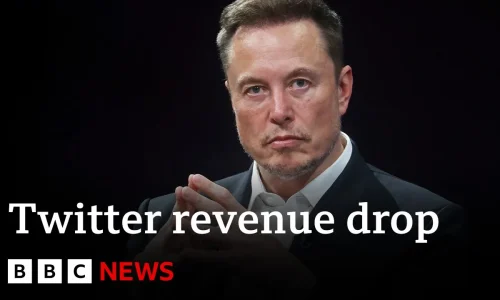See all BBC News transcripts on Youtube

Twitter advertising revenue halves since Elon Musk takeover – BBC News
3 minutes 19 seconds
🇬🇧 English
Speaker 1
00:00
The relatively new owner of Twitter, Elon Musk, has revealed that it's lost more than half of its advertising revenue since he bought the platform last October. Twitter currently has around $13 billion worth of debt, which is due to be repaid by the end of July. It's also facing rising competition from Threads, which launched earlier this month and now has 150 million users. We're joined now from New York by our North America business correspondent, Michelle Fleury.
Speaker 1
00:28
Michelle, must can be remarkably candid at times, can't he? How serious is this loss of ad revenue, do you think?
Speaker 2
00:38
Well, I think what we're seeing here is a sort of casting of doubt on the statement he made to the BBC to 1 of my colleagues earlier this year, in which he said that most of the advertisers had returned to the company after he'd purchased it. That perhaps may not be so true if this kind of loss of revenue on that kind of scale is indeed happening. And it poses a problem for him because this deal cost him $13 billion in debt.
Speaker 2
01:07
He has to keep financing that. And so, as he said in a tweet, you know, over the weekend, they don't have the luxury to focus on anything else but getting cash flow. We have seen past attempts trying to monetize on the idea of people buying blue ticks, but the problem is there hasn't been enough of that, enough, it hasn't generated enough revenue. And so it's a real challenge for Mr.
Speaker 2
01:29
Musk, but also for Linda Yaccarina, who is the CEO he appointed to come in and try and shore up the business, and whose background comes from the advertising sector at NBCUniversal. She is reportedly in conversations with influencers, with celebrities, trying to encourage them and also trying to encourage the creator class, if you like, to come on the site and kind of post videos and content.
Speaker 1
01:56
And on top of all those pressures, the Facebook owner, Meta, trying to eat Twitter's lunch, launching its own version of Twitter, Threads, 150 million sign-ups in just the last few weeks. Are we any the wiser now as to just how much of a threat Threads poses to Twitter?
Speaker 2
02:16
Look, I mean, there are a couple of sites that kind of track usage of social media platforms. And Twitter does appear, by those metrics, to have taken a hit since the arrival of threads. But, you know, there's a shiny new object, as it were.
Speaker 2
02:30
People are excited about it. The question is, does that continue? And I think that's going to be the key issue, certainly for Twitter going forward. You know, does that bleeding continue, or is it just kind of, you know, a momentary thing, in which case it'll recover and be fine?
Speaker 2
02:44
You have to remember that Twitter is a very vibrant social media platform that is very hard and difficult to replicate. Threads, because of its inbuilt connection with Instagram and that audience, kind of gets off to a big start. And so people are seeing it as a potential real challenger. But, again, I think we have to wait and see how things develop.
Speaker 2
03:01
Do people stay with it? Do they continue to use threads? You know, or do the 2 continue to coexist as kind of different things, 1 being a more political site, the other 1 a place for sort of happier content, which is what threads initially, that seems to be kind of its secret source. Okay, Michelle Flurry in New York, thank you very much for joining us.
Speaker 2
03:16
Seems to be its secret sauce.

Omnivision Solutions Ltd
- Getting Started
- Create Transcript
- Pricing
- FAQs
- Recent Transcriptions
- Roadmap